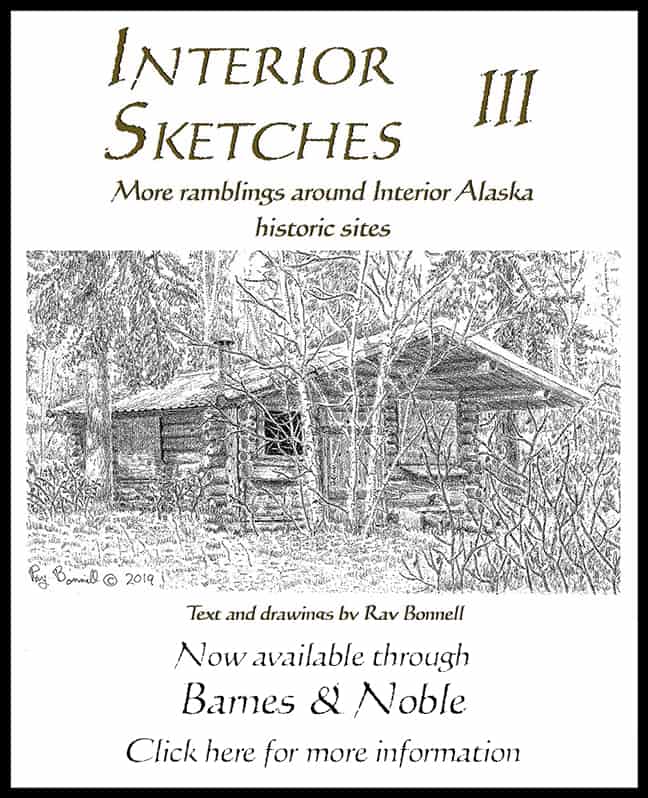1915 Tanana Chiefs Conference was one of the first steps toward Alaska Native Claims Settlement Act

Representatives from the Native villages of Chena, Cosjacket. Minto (Old Minto), Nenana/Wood River, Salchaket, Tanana/Fort Gibbon, and Tolovana attended the two-day meeting. Another Athabascan, Paul Williams, served as interpreter. The drawing depicts six of the chiefs, plus the interpreter. Drawing is based on historical photo in University of Alaska Archives.
On July 5 and 6, 1915, one of the precursors to the 1971 meeting of Alaska Native elders to discuss the pending Alaska Native Claims Settlement Act was held in Fairbanks, in the George C. Thomas Memorial Library at the corner of First and Cowles streets.
It was there that 14 leaders from Tanana Athbascan villages in the lower Tanana River Valley, including 10 identified as chiefs, met with representatives from the federal government to discuss impending federal actions that would affect the Athabascans, and listen to their concerns. The meeting is referred to as the Tanana Chiefs conference.
According to the 2018 book “The Tanana Chiefs: Native Rights and Western Law,” edited by William Schneider, the meeting came about through the efforts of Alaska’s Congressional representative, James Wickersham. Before being elected, Wickersham had lived in Fairbanks, presiding as judge for Alaska’s Third Judicial District. He was sympathetic to the needs of the Athabascans, especially with the impending construction of the Alaska Railroad.
Representatives from the Native villages of Chena, Cosjacket, Minto (Old Minto), Nenana/Wood River, Salchaket, Tanana/Fort Gibbon and Tolovana attended the two-day meeting. Another Athabascan, Paul Williams, served as interpreter. The drawing depicts six of the chiefs, plus the interpreter.
Rev. Guy Madara, who was priest at the Salchaket Episcopal mission, also attended. He filled the role, of what Bill Schneider called, a “cultural broker … attempting to reinforce and explain comments by the Native leaders.”
Besides Madara and Wickersham, government agents, H. J. Atwell and Thomas Riggs, were also participants. The first day’s agenda focused on land issues.
According to the transcript of the meetings, Atwell, with the government Land Office, told the leaders that the government could help them apply for Native homesteads or establish reservations (the two government-preferred options for dealing with Native land issues). Riggs, responsible for building the Alaska Railroad, told them that after the railroad was completed, the country would be, “… overrun with white people. They will kill off your game, your moose, your caribou and your sheep … the Indian must protect himself by one of the methods which has been outlined.”
After hearing from government officials, the chiefs conferred and most decided that neither homesteads nor reservations were desirable. Homesteads would require Natives to live year-round away from each other, destroying Native communities, and the chiefs believed reservations would not support their subsistence lifestyle.
Chief Alexander of Tolovana told the government representatives that, “… we are people that are always on the go, and I believe that if we was [sic] put in one place we would die off like rabbits.”
Chief Joe of Salchaket added, “We are suggesting to you just one thing, that we want to be left alone.”
Since further discussions on land issues appeared futile, the next day was devoted to other concerns of the chiefs, including the chiefs’ desire for trade schools to teach marketable job skills, better access to wage jobs, better health care, and representation in decision-making that affected them.
At the end of the meetings Wickersham promised to pass the chiefs’ concerns on to the Secretary of Interior.
There were no concrete actions that came out of the conference, but it represented one of the first times that Natives had been consulted on issues that affected them. It also showed the chiefs’ resolve to speak out on important issues and become involved in representing their people and lobbying for change. From small steps like this, Alaska Natives developed a voice and a unity that eventually led to real changes such as the Alaska Native Land Claims Settlement Act.
Sources:
- “How Athabascan leaders crafted the Tanana Chiefs Conference.” Matt Buxton. In “The Fairbanks Daily News-Miner”, 6-12-2019
- “Proceedings of a Council, Fairbanks, Alaska, July 5, 1915.” Wickersham State Historic Site Manuscripts, Alaska State Library Historical Collections.
- “The Tanana Chiefs, Native Rights and Western Law.” William Schneider, Thomas Alton, Will Mayo, Natasha Singh & Kevin Illingworth. University of Alaska Press. 2018





